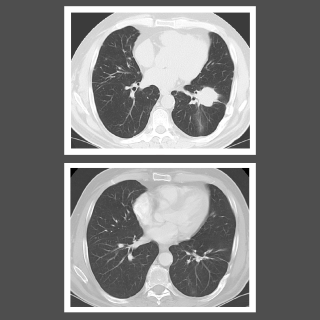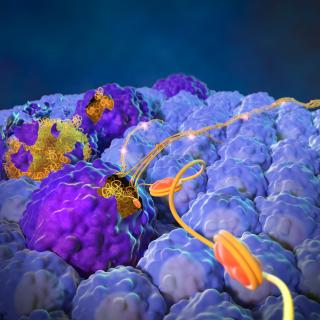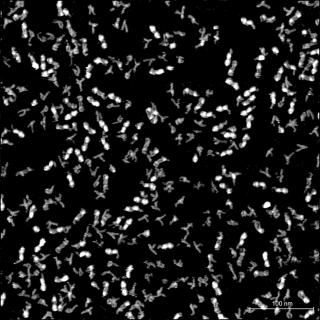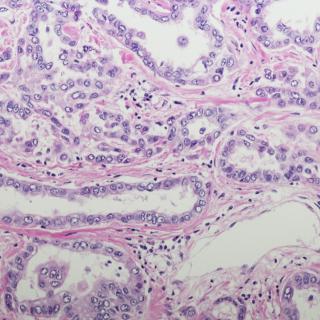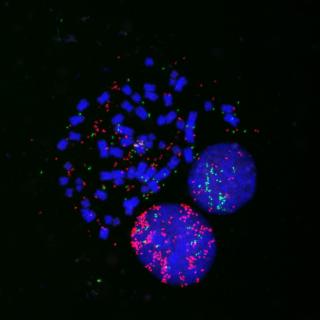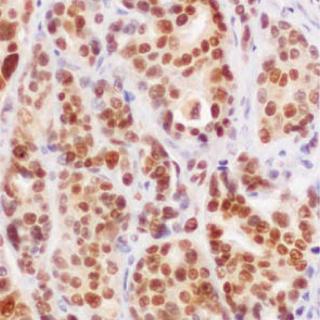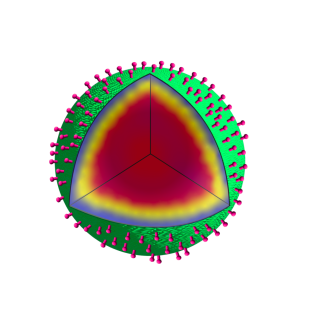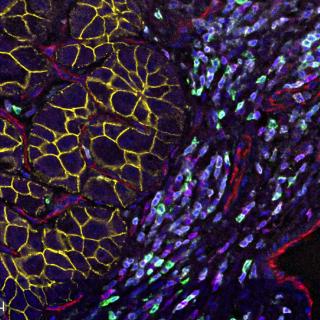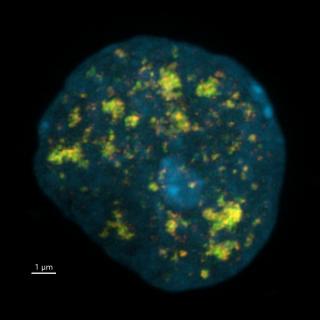Our Discoveries
NIH study finds that immunotherapy substantially increases survival of people with lymphomatoid granulomatosis
Results from a clinical trial conducted by CCR researchers show that people with low-grade lymphomatoid granulomatosis who are treated with interferon-alpha, a type of immunotherapy, can live for decades after diagnosis. Lymphomatoid granulomatosis is a rare precancerous condition triggered by Epstein-Barr virus infection. The findings suggest that immunotherapy can prevent the progression of low-grade disease to high-grade disease, which has a poorer prognosis and can quickly turn into an aggressive and fatal B-cell lymphoma.
Read MoreSignals released from dying cancer cells accelerate metastatic tumor growth
The final act of a dying cancer cell may be to spur the growth of other cancer cells.
Read MoreResearchers discover the multiple shapes of RNA, a boon for drug design
Using atomic force microscopy, CCR researchers directly observed individual RNA structures in cell-like conditions. They found that one primary RNA sequence can fold into many different conformations, which has important implications for the fundamental understanding of RNA and RNA-targeted drug design.
Read MoreA rare look into what makes mesothelioma aggressive, and potentially treatable
Scientists have a limited understanding of mesothelioma and how to treat it effectively, but that’s beginning to change. In a novel study, CCR researchers identified a 48-gene signature associated with a worse prognosis – but also identified a subset of patients who respond to certain immunotherapy and chemotherapy drugs.
Read MoreExtrachromosomal DNA promotes aggressiveness of small cell lung cancer
Cancers harboring small particles of DNA that exist outside of chromosomes, called extrachromosomal DNA (ecDNA), are associated with aggressive tumor growth, drug resistance, and shorter patient survival. New research shows that ecDNAs in small cell lung cancer contribute to variability between cancer cells, allowing them to rapidly evolve and leading to these undesirable outcomes.
Read MoreFirst clinical trial testing a prevention for breast cancer metastasis to the brain yields encouraging results
When breast cancer metastasizes to the brain, new tumors usually develop even after treatment. But recurrence was low among women who received low-dose temozolomide with T-DM1 in a phase I clinical trial.
Read MoreResearchers create a novel cancer drug delivery system inspired by bacterial spores
CCR researchers, led by Senior Investigator Kumaran S. Ramamurthi, Ph.D., have found a way to deliver drugs directly to cancerous tissue — at least in an animal model — by copying the structure of bacterial spores. Their synthetic, spore-like particles are a novel approach to avoiding the harmful systemic side effects of chemotherapy.
Read MoreResearchers uncover stable molecular networks inside liver tumors
The ever-changing nature of tumor microenvironments makes treating cancerous tumors difficult. CCR researchers, led by Xin Wei Wang, Ph.D., Deputy Chief of the Laboratory of Human Carcinogenesis, have performed single-cell RNA sequencing analyses on samples from 44 liver cancer patients. They have uncovered stable molecular networks that cells within liver tumors use to speak with nearby immune cells, which could open a path for therapeutic exploration for liver cancer.
Read MoreDrug Combination Shows Promise for Rhabdomyosarcoma, but Can It Get to Clinical Trials?
A study led by Marielle E. Yohe, M.D., Ph.D., Lasker Clinical Research Scholar in the Laboratory of Cell and Developmental Signaling, and Javed Khan, M.D., Deputy Chief and Senior Investigator in the Genetics Branch, has identified a potential new treatment for children with rhabdomyosarcoma. The researchers are exploring options and hope to test their drug combination in human clinical trials.
Read MoreWhen chemotherapy interrupts genetic programs critical for neuronal development and activity, cells accrue DNA damage and die
To become neurons, brain cells must damage and immediately repair their own DNA. Some chemotherapies may harm neurons by interfering with this process.
Read More